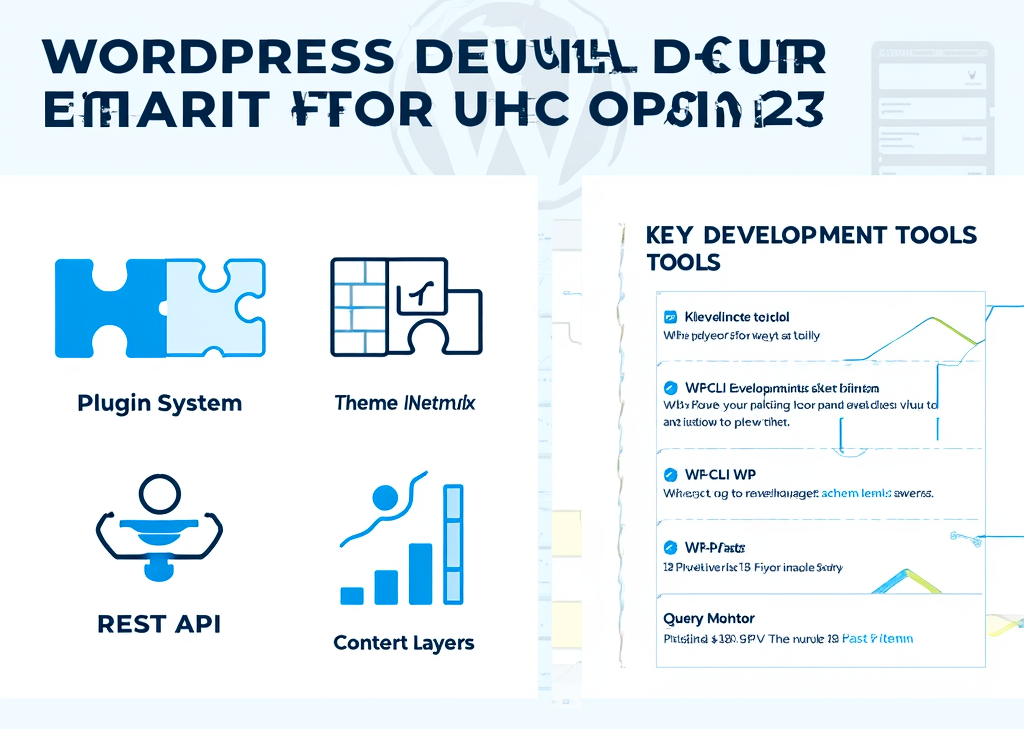WordPress for developers: Key features
Meta description
Discover the vital WordPress features developers rely on, including plugin and theme development, APIs, customization tools, and essential development workflows.
Introduction
WordPress remains the most popular content management system (CMS), powering millions of websites worldwide due to its flexibility and extensibility. For developers, WordPress presents a robust platform with powerful features to build custom websites, plugins, and themes that cater precisely to client needs. Understanding these core developer features and tools is essential for maximizing WordPress’s capabilities and delivering scalable, efficient solutions.
Main section
Core Developer Features of WordPress
WordPress Plugin System
One of WordPress’s most powerful features for developers is its plugin architecture. The plugin system allows developers to extend core functionality without modifying the core codebase directly. Imagine having a toolbox filled with endless possibilities; that’s the Plugin API for you. It offers thousands of hooks and filters to customize behavior and add new features. Plugins can range from simple additions like social media buttons to complex solutions such as eCommerce platforms or membership portals. Developers often find themselves in a creative zone as they leverage PHP for custom development, intertwining it with JavaScript for advanced features like custom blocks.
Theme Development
Themes are the stylish clothes that wrap around a WordPress site, giving it identity and flair. Picture a tailored suit that fits perfectly. Developers craft custom, responsive themes to align with brand identities, ensuring a seamless user experience across devices. The process of theming intertwines PHP, HTML, and CSS, evolving increasingly toward modern JavaScript practices, especially with the rise of block-based editing. And let’s not forget the magic of patterns—pre-designed blocks that simplify content creation for users, making life just a little bit easier.
Application Framework and APIs
WordPress serves as more than just a blogging platform; it’s an application framework providing essential components like user management and database abstraction. Imagine using a reliable engine that powers your car—WordPress handles the ride. Developers can leverage the REST API to create decoupled architectures or mobile apps fueled by WordPress content. This opens a treasure chest of possibilities, giving life to modern frontend frameworks and hybrid applications that break traditional molds.
Custom Content Management
Beyond mere posts and pages, WordPress enables developers to create custom post types, taxonomies, and tailored content workflows. Visualize a community garden where every plant has its space; this is how custom content management works for varied projects—from portfolios bursting with creativity to complex business applications, empowering clients with an intuitive backend experience that resonates with their content needs.
Custom Code Integration
Injecting bespoke code into themes or custom plugins is a developer’s way of sprinkling magic dust on their projects. They seamlessly integrate third-party services—think social media feeds or unique analytics tracking—while adhering to WordPress’s architectural elegance. Custom blocks designed with JavaScript or advanced PHP functions enhance site functionality. It’s like adding secret ingredients to your grandma’s recipe, elevating the final dish to something even more extraordinary.
Essential Development Tools and Best Practices
Local Development Environments
Using robust local development tools like Local WP or WP-CLI is akin to having your workshop. These tools streamline coding, testing, and debugging, making tasks less daunting. Operating WP-CLI can feel like slipping into a pair of well-worn shoes—easy and efficient. With one command, developers can bulk update plugins or migrate sites, allowing for automated tasks that eliminate unnecessary admin panel navigation, reducing development time while enhancing accuracy.
Plugin Development Tools
The WordPress Plugin Boilerplate is a beacon for developers, providing a standardized, reusable codebase structure for building plugins efficiently while adhering to best practices. It makes crafting engaging plugins almost poetic. Testing frameworks like PHPUnit are vital for ensuring that PHP code holds up under stress, reporting any unwelcome surprises before hitting the stage. Tools like hookr.io serve as an interactive map, helping developers explore WordPress hooks and implement them more effectively.
Version Control and Collaboration
In the era of teamwork, GitHub integration signifies a leap towards modern development. Picture a bustling café where ideas flow freely among friends—this is collaboration at its best. Managing code repositories and automating deployments through GitHub Actions transcends traditional workflows, allowing for a seamless collaboration space among developers. Some hosting platforms elevate this experience by providing integrated deployments to supplant the manual process.
Custom Code Management Plugins
Tools like WPCode are the guardians of developers’ creativity, permitting them to safely add and manage custom code snippets without meddling directly with theme files. It’s like having a reliable safety net—no more worries about broken updates! This protective layer shields customizations from being overwritten during theme updates while making the debugging process smoother.
Performance and Debugging Tools
Every developer knows the anxiety of performance stalls during site launches. Fear not! Tools like Query Monitor step in like a seasoned coach, guiding developers to identify performance bottlenecks, database hitches, and pesky PHP errors lurking in their code. These analytical tools are crucial for fine-tuning website speed and security, essential for maintaining professional-grade sites.
Browser Extensions
No developer’s toolkit is complete without handy browser extensions. Tools such as CSS Scan and Responsive Viewer act like magic glasses—everything appears clearer, making CSS inspection and responsive testing swift and efficient. With these extensions by their side, developers enhance theme customization and debugging processes, transforming the daunting into the doable.
As we unravel the capabilities of WordPress for developers, it becomes evident that the journey doesn’t merely end with an understanding of these features. The evolving landscape of web development, innovations in tools, and the constant push towards optimization form an ongoing narrative that each developer gets to contribute to.
BEST OFFERS:
Do you want to create your own company website or create your own online business on the Internet?
– WEB HOSTING
– DOMAIN REGISTRATION
– WEB DEVELOPMENT
– SITE BUILDER



Enhancing WordPress Development Skills
As the digital landscape continues to advance, the necessity for developers to hone their skills and embrace new technologies becomes paramount. Staying updated with WordPress’s latest features allows you to utilize the platform to its fullest potential. Here are some essential practices for further enhancing your development skills:
Continuous Learning
The world of web development is constantly evolving, and WordPress is no different. Engaging in continuous learning through online courses, webinars, and tutorials is key. Websites like Udemy and Codecademy offer tailored courses for WordPress development. Learning new languages, libraries, and frameworks will only enhance your capability as a developer.
Participation in WordPress Communities
Joining WordPress communities like WordPress.org forums or subreddits such as r/Wordpress provides a compelling opportunity to connect with other developers. Sharing experiences, discussing challenges, and exchanging tips fosters a collaborative spirit that enriches your own skillset. Local meetups and WordCamps are also fantastic venues for networking and sharing knowledge.
Contributing to Open Source
Contributing to the WordPress core or developing plugins/themes for the wider community not only fast-tracks your learning but also gives back to the ecosystem. Engaging in open-source projects on platforms like GitHub helps refine your code skills, understand complex problems, and identify standards followed in the industry. Plus, it’s a satisfying way to leave your mark on a platform that supports millions of users.
Performance Optimization Techniques
Your development skills can shine even more with a keen focus on performance optimization. A well-optimized WordPress site not only enhances user experience but also ranks better in search engine results. Here are some practical techniques:
Caching Strategies
Caching is one of the most effective ways to boost website performance. Utilizing caching plugins such as W3 Total Cache or WP Super Cache can dramatically decrease load times. It creates static copies of your site, reserving server resources and expediting page delivery to users.
Image Optimization
Large images can bog down your site speed significantly. Using tools like Smush for image optimization compresses images without sacrificing quality. This ensures a visually appealing site while keeping load times in check.
Minifying Files
Minification involves stripping down unnecessary characters from your CSS, HTML, and JavaScript files, thus reducing file size and improving load speeds. You can leverage tools like Autoptimize to automate this process, refining your assets efficiently.
Security Best Practices
As developers, ensuring the security of your WordPress site is as important as creating stunning features. Implementing robust security protocols protects both your investment and your users:
Regular Updates
Keeping WordPress, themes, and plugins updated is your first line of defense. Each update often includes security patches that protect against vulnerabilities. Consider setting up automatic updates to enhance your site’s safety without manual intervention.
Using Security Plugins
Integrating security plugins like Wordfence or Sucuri Security helps safeguard your site against malware and attacks. These tools monitor, scan, and even provide firewall services that reinforce your site’s integrity.
Implementing Strong Password Policies
Encouraging strong password policies among users and maintaining two-factor authentication (2FA) can mitigate unauthorized access. Using plugins like WP 2FA offers users an additional security layer, ensuring database protection alongside regular access credentials.
Final Thoughts
With a solid understanding of WordPress’s core features, essential tools, optimization techniques, and security protocols, developers can navigate the intricate world of WordPress with confidence and agility. Each line of code contributes to a broader narrative, shaping user experiences and driving engagement. The more you immerse yourself in this vibrant ecosystem, the more you unlock your potential. The journey of a developer is one of continuous evolution, creativity, and innovation.
As you explore the vast opportunities within WordPress, consider this: every project, every website crafted, contributes to an expansive tapestry of digital experiences. Embrace this path, and let your coding journey unfold in unexpected ways.
Additional Resources
- The Complete WordPress Developer Course on Udemy
- WordPress 5 Development Essential Training on LinkedIn
- Ultimate Guide to WordPress Development on SitePoint
Relevant Videos
- Plugin Development in WordPress
- Theme Development Basics for WordPress
- Optimizing WordPress for Speed
BEST OFFERS:
Do you want to create your own company website or create your own online business on the Internet?
– WEB HOSTING
– DOMAIN REGISTRATION
– WEB DEVELOPMENT
– SITE BUILDER








